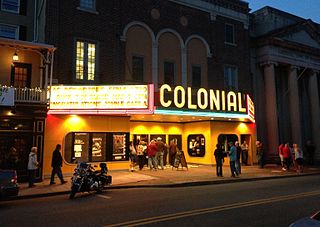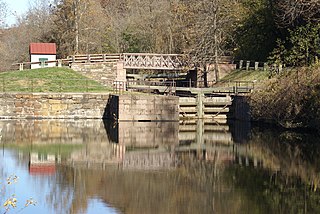Related Research Articles

Schuylkill County is a county in the Commonwealth of Pennsylvania. As of the 2020 census, the population was 143,049. The county seat is Pottsville. The county is part of the Northeast Pennsylvania region of the state.

Phoenixville is a borough in Chester County, Pennsylvania, United States. It is located 28 miles (45 km) northwest of Philadelphia at the junction of French Creek and the Schuylkill River. It is in the Philadelphia metropolitan area. According to a 2022 estimate, the population was 19,354.

Upper Providence Township is a township in Montgomery County, Pennsylvania, United States. As of the 2010 census, the township population was 21,219.

Mount Carbon is a borough in Schuylkill County, Pennsylvania, United States, two miles south of Pottsville. It was formed from North Manheim Township in 1864. The population was 88 in the 2020 census. The borough is the smallest municipality in Schuylkill County.

Tamaqua is a borough in eastern Schuylkill County in the Coal Region of Pennsylvania, United States. It had a population of 6,934 as of the 2020 U.S. census.

The Schuylkill River is a river in eastern Pennsylvania. It flows for 135 miles (217 km) from Pottsville southeast to Philadelphia, where it joins the Delaware River as one of its largest tributaries.

The Union Canal was a towpath canal that existed in southeastern Pennsylvania in the United States during the 19th century. First proposed in 1690 to connect Philadelphia with the Susquehanna River, it ran approximately 82 mi from Middletown on the Susquehanna below Harrisburg to Reading on the Schuylkill River.

The Schuylkill Canal, or Schuylkill Navigation, was a system of interconnected canals and slack-water pools along the Schuylkill River in the U.S. state of Pennsylvania, built as a commercial waterway in the early 19th-century. Chartered in 1815, the navigation opened in 1825, to provide transportation and water power.
Oaks is an unincorporated community located in Upper Providence Township, Montgomery County, Pennsylvania, United States. The community is 18 miles (30 km) northwest of Philadelphia and its boundaries are defined in large part by the village's position at the junction of Perkiomen Creek and the Schuylkill River.

The Schuylkill River Trail is a multi-use trail along the banks of the Schuylkill River in southeastern Pennsylvania. Partially complete as of 2018, the trail is ultimately planned to run about 140 miles (230 km) from the river's headwaters in Schuylkill County to Fort Mifflin in Philadelphia.

French Creek, once known as Saukanac Creek, is a 22.6-mile-long (36.4 km) tributary of the Schuylkill River in Berks and Chester counties, Pennsylvania, in the United States. The water course was also known as the Vincent River, after Sir Mathias Vincent, who purchased land along it in Chester County in 1686.

Mont Clare is a village in Upper Providence Township, Montgomery County, Pennsylvania. The village is located on the left bank of the Schuylkill River opposite Phoenixville and Chester County. Mont Clare is at the site of the former Jacobs' ford. Mont Clare hosts the only functional lock and one of only two remaining watered stretches of the Schuylkill Canal. Mont Clare was the birthplace of the infamous outlaw Sundance Kid. As of the 2020 United States census the population was 1,852.

The Phoenix Iron Works, located in Phoenixville, Pennsylvania, was a manufacturer of iron and related products during the 19th century and early 20th century. Phoenix Iron Company was a major producer of cannon for the Union Army during the American Civil War. The company also produced the Phoenix column, an advance in construction material. Company facilities are a core component of the Phoenixville Historic District, a National Register of Historic Places site that was in 2006 recognized as a historic landmark by ASM International.

The Schuylkill Branch was a rail line owned and operated by the former Pennsylvania Railroad (PRR) in Pennsylvania. The line ran from the Philadelphia to Harrisburg Main Line at 52nd Street in Philadelphia north via Norristown, Reading, and Pottsville to Delano Junction, about 2.5 mi (4.0 km) northeast of Delano. From Delano Junction, the PRR had trackage rights over the Lehigh Valley Railroad's Hazleton Branch and Tomhicken Branch to Tomhicken, where the PRR's Catawissa Branch began.

Early in the 19th century, the Leiper Canal built in 1828–29 during the middle of the American canal age ran about 3 miles (5 km) along Crum Creek in Delaware County to its mouth in eastern Pennsylvania's Delaware Valley carrying its owner‘s quarried products to docks on the Delaware River tidewater until 1852.

The Mont Clare Bridge is a crossing of the Schuylkill River between Mont Clare and Phoenixville in Pennsylvania, USA. The bridge was also referred to as the Intercounty Bridge, as it connects Montgomery and Chester counties. The bridge abuts a shorter county bridge across the Schuylkill Canal and towpath on the Mont Clare side to complete the crossing. The crossing carries Bridge Street and the Schuylkill River Trail.
Port Providence is an unincorporated village along the Schuylkill River in Upper Providence Township, Montgomery County, Pennsylvania. Originally known as Jacobs, then Lumberville, the village is located on one of the two remaining watered stretches of the Schuylkill Canal. The village was notable as having one of the few inns on the canal between Norristown and Pottstown. Fitzwater Station, a historic tavern, is located in Port Providence, on the canal.
Pickering Creek is a 15.3-mile-long (24.6 km) tributary of the Schuylkill River in Chester County, Pennsylvania.

Elijah Funk Pennypacker was a politician, abolitionist and station master in the Underground Railroad in the United States, in the years leading up to the American Civil War. He operated in Chester County, Pennsylvania. Pennypacker's home, White Horse Farm, was a safe house during the time that he participated in the Underground Railroad. As a station master in the Underground Railroad, Pennypacker reportedly aided hundreds of fugitive slaves in their escape to freedom, without any having been apprehended by authorities or by bounty hunters. He also served as a member of the Pennsylvania House of Representatives, representing Chester County from 1832 to 1833 and from 1835 to 1836.
References
- ↑ "History of Fitzwater Station Archived 2019-10-08 at the Wayback Machine ." Phoenixville, Pennsylvania: The Fitz, retrieved online October 7, 2019.
- ↑ "History of Fitzwater Station," The Fitz.
- ↑ Willingham, Jessica. "The story behind Fitzwater Station." Montgomery County, Pennsylvania: Montco Today, July 20, 2018.
- ↑ "History of Fitzwater Station," The Fitz.
- ↑ "The Underground Railroad: What Was the Brethren Connection? Archived 2019-10-08 at the Wayback Machine ", in Living Parables: Church of the Brethren Annual Conference Journal, July 7, 2018, p. 2. Elgin, Illinois: Church of the Brethren, retrieved online October 7, 2019.